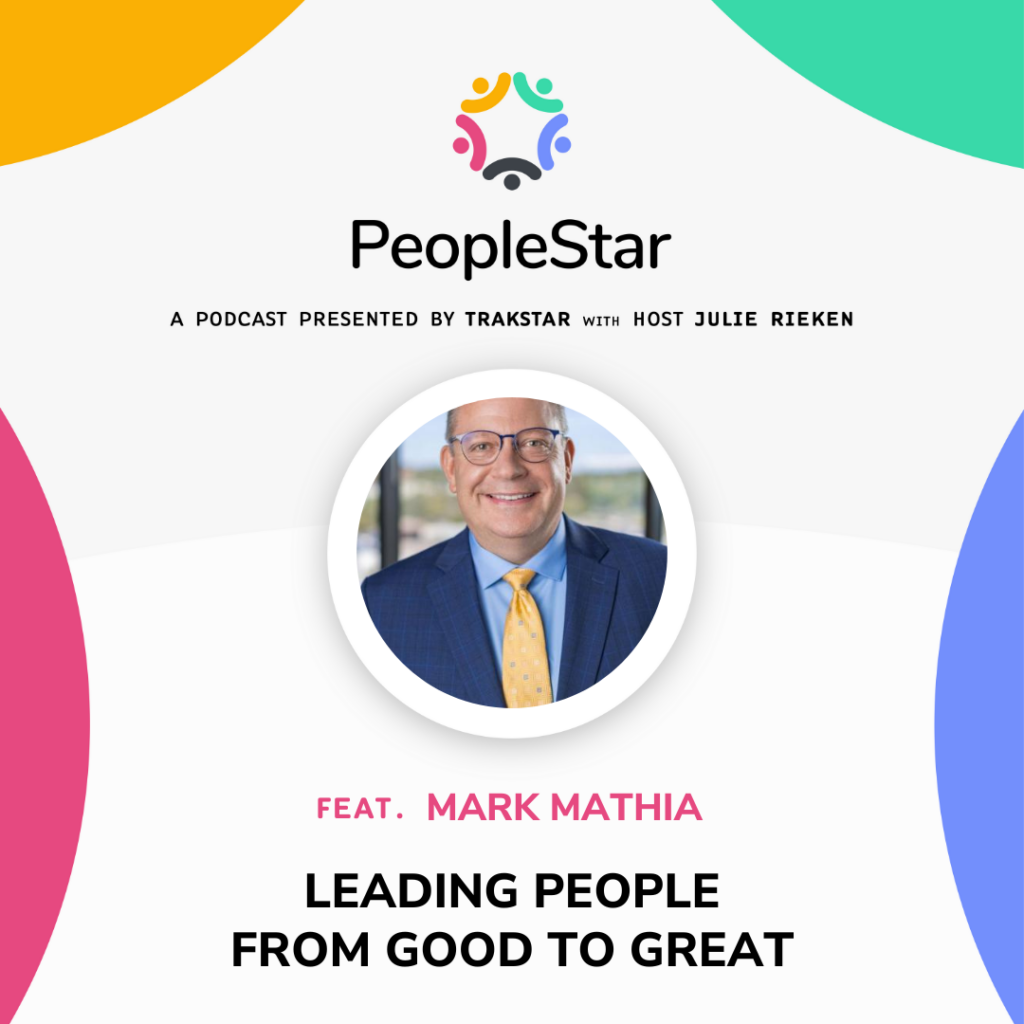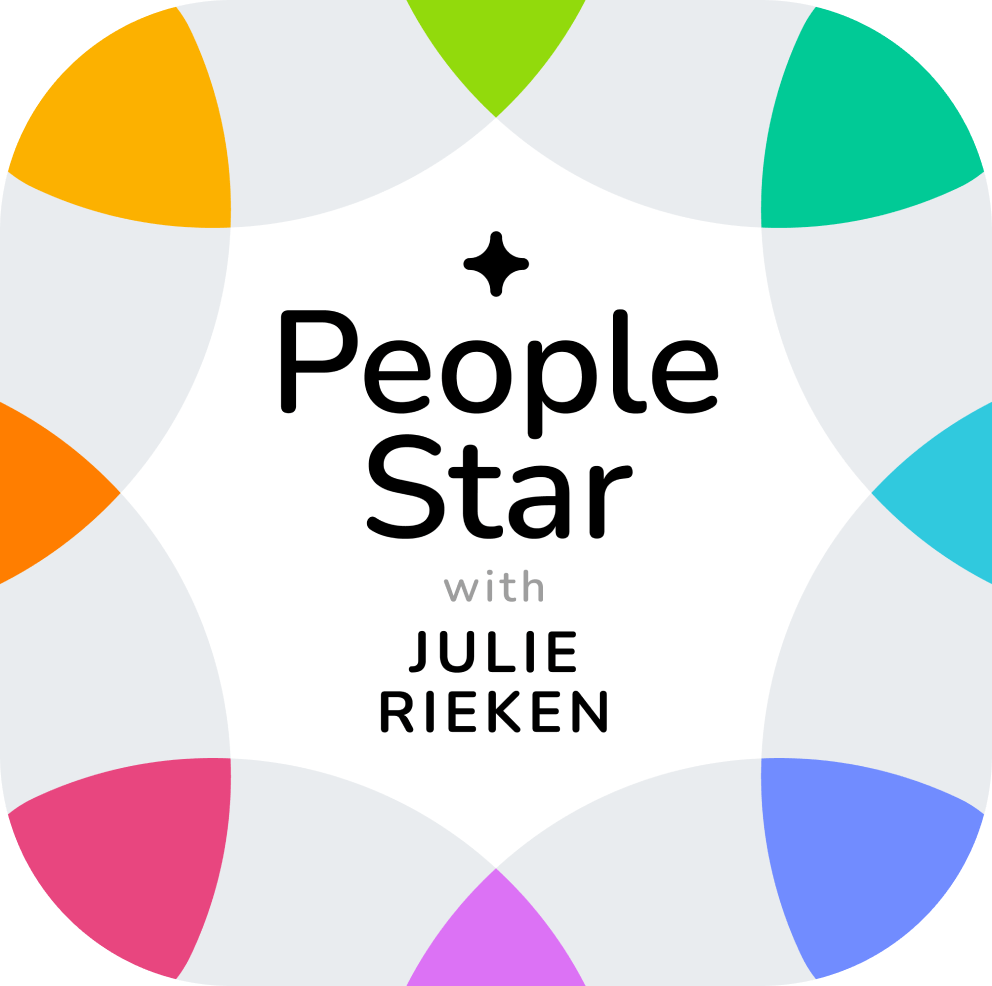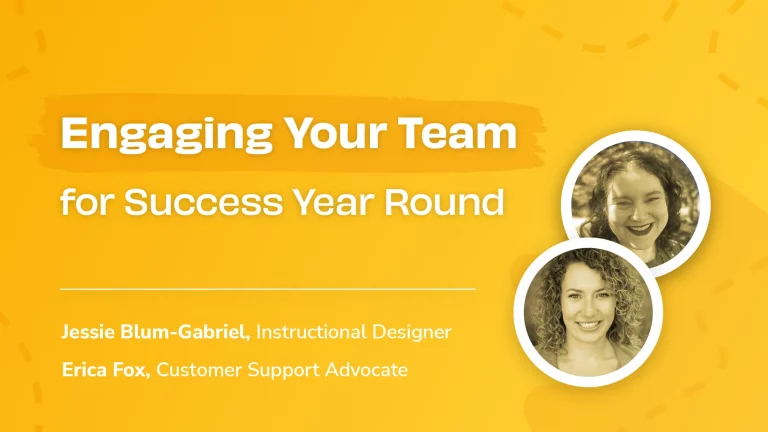PeopleStar_Mark Mathia: this mp3 audio file was automatically transcribed by Sonix with the best speech-to-text algorithms. This transcript may contain errors.
PeopleStar Intro/Outro:
Welcome to the PeopleStar Podcast. We deliver leadership perspectives from industry experts on their people, architecture, routines, and culture as they solve HR's newest challenges. And now your host, Julie Rieken.
Julie Rieken:
Good day podcast listeners, Julie Rieken, host of PeopleStar Podcast. And today I'm really delighted we have Mark Mathia with us. He is from Signature Performance, he's got a super cool background and some really interesting things with Signature Performance that we're going to talk about today. Just a couple of highlights, they've recently made their organization, they've taken their HR group and split it into two pieces, talent ops and talent acquisition, we're going to talk about why they did that, and seven times, Signature Performance has been recognized as a best place to work. This is quite an honor, and I want to just talk about that thread and what does that mean and how do you get that? And Mark, what's your role in that? So anyway, Mark.
Mark Mathia:
Julie, thank you! It is so fun to be here, I've enjoyed listening to your work and I'm privileged to be here, a best place to work organization. It's something that I always aspired for, but it wasn't everything that I pursued. That's weird, right? We look at best places to work as our one external kind of poll or pulse that we take, and that just so happens sometimes we win that thing and boy, we're really happy. The experience there with best places to work I think is really important for us because when you're listening really well, things start to shift. And by listening, it doesn't matter whether it's internal or external pulses, it's like, what do you do with that information? How do you employ that information? I think that's one of the reasons why we were been fortunate to be named that over and over. Associates come into our organization with expectations, we want them to come in with a clear picture of what's really real, and then we want to outperform expectations from an associate standpoint. And so that's really the secret sauce behind it. You brought up another interesting point of why did we recently split into talent ops-talent acquisitions, and I will tell you this, it's so, headline, when your company grows really fast and you move in the company life cycle from, I call it like an emerging organization, we all, this company started with 4 or 5, like entrepreneurial thinkers, right? And it was built around this get it done thinking, everything's just moving. And then we become a medium-sized and then a large-sized organization. That transition caused us to move into this zone of predictable success. And the only way that we can really stabilize and continue to grow is through looking at our people side of the business and making sure that we're positioned to meet the upcoming growth aspirations that we have. And so really, strategy drives our movement in talent. And for us, one of the things is we're in health care, which is a very sensitive, important in and of itself, we're in the administration of health care. And one of the things that has happened is we've noticed that we wanted to attain all our compliance and everything that our great human resource team did, but also uplevel that because we wanted to match the necessities of human resource with the aspiration of what it takes to really lead talent into the future, how do we become and remain a great place to work through the entire employee life cycle? Talent operations became specifically those folks who can pull alongside of our associates to get questions answered to support them, not just compliance. We're not in it just to make sure our action plans are written up, know we're there to support people. And talent acquisition was a bold move. That said, if in this labor market, post-pandemic, we're going to need to specialize in recruiting and we're going to pull it all in house. And so have two very talented and special leaders that lead both of those divisions who bring a special touch to each one of them. And as we've expanded, what that's done for Signature Performance, it's made sure that we maintain the best and the brightest talent coming into our pipelines and eventually to join our team.
Julie Rieken:
I love that, I've got so many questions about this. So can we go back to this? You were saying that seven times Signature Performance has received the award of being a best place to work, and if I heard you correctly, one of your strategies has been to listen.
Mark Mathia:
Yes.
Julie Rieken:
And listening is a deliberate action. How do you listen to people? Do you have formal and informal mechanisms for listening? And if what do those look like?
Mark Mathia:
Yeah. And so, by the way, for anyone wanting to really improve culture within an organization, I would start there, right? It's how you listen and it's how our associates feel like we listen, right? So it's both perception and then reality. So the formal mechanisms, right? Like most companies, we, we have pulses. We happen to use Qualtrics, but we do quarterly engagement pulses, we have our own terms for it. It's not unlike the brilliant work Gallop has brought to the industry with their Q12, we have about 14 to 16 questions. And then we have a voluntary questioning of 5 or 6 more that's just on diversity, equity, inclusion, and belonging, because that's another area that I think we need to heighten our ears and listen more deeply so that we understand. That would be formal. We have other pulses that come out based on what we find. Best places to work just rolled out. And one of the things we found out is that there's some questions about our benefits. How do we do that? So that created another listening circle. So another loop we opened to really get information about what's being said there because didn't get enough data from the external survey to validate what my assumptions were becoming. So I sought additional information. And by the way, our organization is highly engaged. We get a lot of feedback when we ask questions, and that's so good. Part of the reason is then we set up and complete each feedback loop. So if I ever survey, we have a town hall, we have a kind of a, we call it Signature Live, it's a once a week gathering around the water cooler. Now that we're a little bit more virtual and hybrid. So we do this virtually. We have our own little TV show, but I go through the data, I show the results, I talk about what we learned, and then I talk about the next steps in that learning. And then I walk them through all the way to execution. How do we take that learning and translate that into actions that help make our associates life's better. So those are the formal ones. We also have two other I think are really important and unique to Signature. The first is coaching. Now this is the odd thing, I'm a coach by heart, I love to coach. And by coaching, I'm like, literally, I want to pull out the best in individuals, not to make them like me, but so that they can show up their authentic, true self in the best fashion, we use Clifton StrengthsFinders, who are a strength based organization. We have three on board coaches, but every associate has access to coaching around their strengths and the role that we're at because I believe that if you can bloom where you're planted, if you can grow right where you're at by using your best self, then all of a sudden you become an expert or subject matter expert in a part of health care you're solving, and that leads to greater opportunity in the future. So coaching is really unique, and through that coaching kind of mechanism, I get all kinds of feedback and I build all kinds of trust. And so that's a really cool component that makes us a little bit different. The other side of that is we've taken every manager and we call it the Signature Performance Management Group, so it's SPMG. But that group of individuals I personally take an interest in because I believe that they're the ones that touch our associates and our clients the most. And so that's where we really need to focus that communication so that when we're hearing from our associates, I'm personally delivering it to the management team and leaders who impact the broader, the broadest swath of influence in the organization. And I'm getting them the information to them directly. So we have biweekly newsletters, we have town, town hall meetings all the time. We pull them together this year for the first time. We want to get everybody together. We're hoping we can make that happen. It's quite a large group, so it's no small feat, but we want to get everyone together and just invest into them because in order for them to listen, they have to understand what it's like to be heard. And so we want to model that behavior where every manager has an outlet, every manager has a coach, and then we want to teach how to do that as well. So you have the organizational culture as a whole that our team oversees and helps with. But I believe that every manager has independent micro cultures underneath them. Gallup says 70% of people leave their organization because of their manager. So good, bad or indifferent, I don't understand why more companies don't spend more time investing in that, and that's certainly a place where we've really doubled down and said, how can we make the management experience at Signature the best it can be so that these feedback loops can be sharpen, sharpened, So don't wait for survey data. I really want the managers to be proactive and listening as well, and I want them to know that when they elevate things to me that I'll listen to them and then we can take proactive action. So that would be the formal, informal side of how we're how we're doing it. And I would say this, that we also spend a lot of time in internal communications or corporate communications. And and one of the things there that I think is really important is when you set up a corporate communications department, everyone thinks what you're going to talk more. The truth was what we really needed to do was get rid of the noise. And so we actually shut down more channels than we opened. And then we got better at the channels that we opened. And so there was a little secret kind of nugget in that if you really want to be able to listen and be heard, you need to get rid of noise. And that ruffled some feathers because when you start cutting back on communication. Everyone, I'm losing this, I'm losing this, I can't send my list all anymore. And so no, but, we will make sure that information that needs to hit on target arrives in time. And so that's a core component of everything that we've done to make sure that listening cycle is impactful.
Julie Rieken:
Oh, there's so much fascinating content that you just shared. I love the reduction exercise because sometimes when there's so much noise, people feel like they're expressing, but it is noise. And when you reduce it, you can respond better. I bet that did ruffle some feathers, but I think it's … It really.
Mark Mathia:
Yeah. Yeah. When you think about the respond all when you think about putting a couple boundaries around how we email each other and then you throw in teams before teams we had other systems but we always find ways to ping each other and the truth is what we need to then be able to do as our organizational EQ gets higher is understand what is important, what is need to know, and then make sure we're camping there and what is nice to know, let's find other ways that we can communicate that on a regular basis so nobody ever feels like something isn't getting communicated. It's just that's going to come out in a normal publication. So we give additional outlets for that stuff and then we put boundaries around other stuff. And with that, with the aspiration anyway of making sure that our channels are really clear and that people have to feel seen, heard, and felt at work.
Julie Rieken:
I love that. Okay, this is, I'm gonna ask one last question, but I think it's big.
Mark Mathia:
Okay.
Julie Rieken:
I think it's a big question. This strategy, like I'm thinking about the idea that you have multiple coaches, Signature has invested in, to coach. That's not small actually that's an enormous move to hire people that do this. So maybe this is a two part question. Whose idea was it and how did you how did that happen?
Mark Mathia:
Yeah.
Julie Rieken:
Was it a collective idea or, because when you ask someone, hey, by the way, we're going to go through our 2023 or whatever budget cycle and somebody says, I want to add three net new headcount.
Mark Mathia:
Yes.
Julie Rieken:
… And I want them to be coaches. Somebody is going to say, oh, okay, and what's my ROI on that? What am I going to get investing in this?
Mark Mathia:
Yeah.
Julie Rieken:
Where I'm going with this.
Mark Mathia:
Yeah, exactly. Yeah. So, so.
Julie Rieken:
Talk more about that decision because it's a human decision, but it's an economic one.
Mark Mathia:
Yeah. Yeah. So first of all, that's where, there's a couple broader assumptions that we need to make. First of all, since the inception, the vision of Signature Performance was to have an employee experience unlike no other. The other part of that is in the mission that we serve to improve the health of our clients business and make the lives of those we work with better. So in our DNA, you have this kind of resonant that says people matter, people really matter here. Now how to bring them to full potential, that's where, because I'm a coach, I believe in coaching, to prove the ROI on coaching is not difficult at all, and that ROI translates directly in your retention statistics and your ability to execute on big problems in real time. Not only that, we see that coming out in the data in terms of our ability to push through resistance, and a great example of that would be an organization coming into a pandemic that's 100%, we had four hybrid workers, right? We were just all located in buildings, and in three days we went … dispersed. And in that time we focused on communications. We doubled down, triple down, some might say. And then that coaching element, the thing and the secret sauce of coaching was that we were able to pivot and everybody had a voice. Now these three coaches that I mentioned, myself included, so I'm, I was the first, we all have day jobs too. So on top of our other responsibilities, we add in coaching. So I have someone in talent operations, or talent operations that's really there to help coach strengths. And then I have another, another person on my team who's my senior instructional designer who, who comes in and helps coach. So between the three of us, we've been able to do that and maintain our other workflows, which is pretty exciting. Now you have to have special people that are willing to do that, meet at odd hours and really connect with people, you have to have a strong code of ethics built in place. So the one thing I told my team when we were adopting this, and I do have a funny story about the whole ROI and how to keep this stuff going, but, but we, so the ROI has always been like primary concern of this. The very first time when we started this as an experience, just an experiment, we just thought, let's see if we can actually bring the vision to life. And I was like, yep, I'm in, we'll do it. And by the way, Julie, at that time we needed it. We were growing so fast that I was promoting like one of every ten people. That means someone could join our company and in a few months get promoted and that's not really healthy long term, if you're going to really serve your clients. So we had to start developing our managers at a rapid pace. Coaching does that on top of all the other technical training that we had. So we assembled our, at that time it was called the President's Council and we just brought it up. I had just hired my first experience manager who came into the company, brilliant mind and experienced probably what I would consider the best in the business. So think brand, think across the board how to make moments. And second day we're at this big meeting and she's given a little report on some of our outcomes and our founder and CEO steps and says, hey, Mark and I have been working on this, it's a brand new thing, we've started to invest some money in it, I need to know. And every department was in this meeting, how's this going? Is it impacting you? Are you feeling it? So at that point, he did a show of so whether we go forward or whether we stop was a vote with my person, my partner now.
Julie Rieken:
On the fly?
Mark Mathia:
… on the job. Yeah. And they just raised their hands and said we're all feeling it. Coaching allowed everybody to feel the work that we were doing in organizational development and experience and everything else because we all had personal relationship and trust was high. So my first vote was a vote of hands, the vote of confidence through the whole company. And I didn't need the majority. I needed it to be unanimous, otherwise it wasn't going to move forward. It moved forward, and then my partner came up to me, her name is Amy, and she said, okay, Mark, that was all fun. Don't ever do that again. But she said, here's the deal, we're never gonna.
Julie Rieken:
Yeah, it landed in your favor, but.
Mark Mathia:
Exactly. Yes, exactly. She said, we're never going to win on popular opinion again. And together we have built an infrastructure of data that supports us and we've been able to track our engagement levels through the programs that we have all the way to our client metrics. And so we know without a doubt that every, for example, is just an example. Nicole invested in experience that includes all those divisions we've been talking about. We'll come back to this organization dressed up like a quarter, and we're really proud of that. We do quarterly report cards that are designed just on ROI, and we've really built a pathway. And I really think the secret to that is the coaching. It's so that associates can really, truly understand how to bloom where they're at and when they can bloom where they're at, then all of a sudden they get momentum. And like John Maxwell said, when you have momentum, about 85% of your problems are solved. And I want associates that have momentum, they feel like they belong, they connect with the mission and that they can really put their best foot at work. And by the way, the coaching at Signature isn't crisis, it's not, oh, this person is in trouble, you need to go coach them. Now we work with everyone who's doing good and we take them to great. So we're always looking at maximizing potential. And then talent operations has other systems in place to help support the other stuff that we need to do. But you'll find us on the forefront and the leading edge, always looking forward, helping people build, grow, develop, and advance their career.
Julie Rieken:
This has been a fascinating conversation about the ROI of investing in people. I've really enjoyed it and I'm inspired and I hope that some of our listeners have some ideas on how to, how to do, how to move forward with this. And, and if nothing else, just understand the value of investing in people. That retention rate, I bet it's awesome and congratulations on the best places to work and thank you so much for sharing ideas with us.
Mark Mathia:
Thanks, Julie! Yeah, thank you so much. And if anyone ever wants to learn more, we do have an internal podcast called Signature Edge and we talk about a lot of our strategies so that you can go in there real time, good, bad or indifferent, we tend to be an open group, but we can talk about it and I'd be happy to share that with anyone who's interested in at least the work we're doing here in health care.
Julie Rieken:
I love it. Thank you and congratulations. And.
Mark Mathia:
Thank you, Julie.
Julie Rieken:
It's been fantastic.
PeopleStar Intro/Outro:
Thanks for listening to the PeopleStar Podcast. For the show notes, transcript, resources, and more ways to get a seat at the table, visit us at TrakStar.com/Podcast.
Sonix has many features that you’d love including transcribe multiple languages, collaboration tools, automated translation, automatic transcription software, and easily transcribe your Zoom meetings. Try Sonix for free today.




